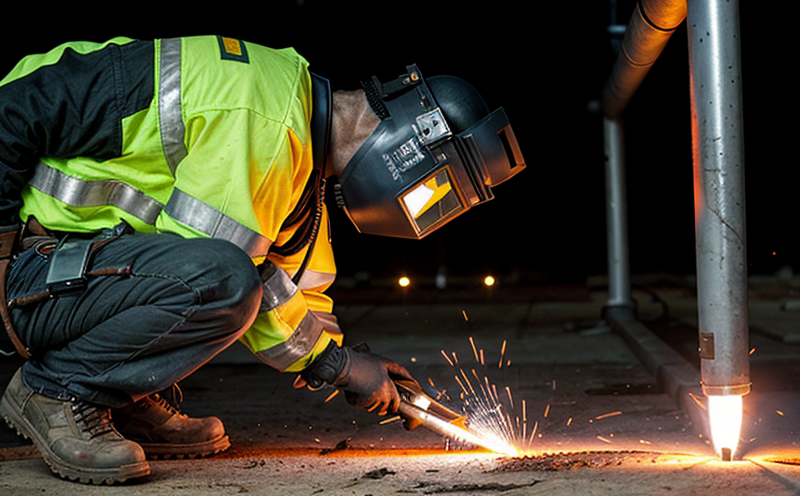Non-destructive testing of welds (NDT methods)
Non-Destructive Testing of Welds (NDT Methods) Ensuring the Integrity and Reliability of Your Assets
As a business owner or manager, you understand the importance of ensuring the quality and reliability of your assets. One critical aspect of this is the integrity of welds in various equipment, structures, and components. Non-destructive testing of welds (NDT methods) plays a vital role in verifying the strength and safety of welds without causing damage or altering the original material. At Eurolab, we offer a comprehensive laboratory service that utilizes advanced NDT methods to inspect welds, providing you with accurate results and peace of mind.
What is Non-Destructive Testing of Welds (NDT Methods)?
Non-destructive testing of welds refers to the process of evaluating the integrity and quality of welds without causing damage or altering the original material. This type of testing involves using specialized equipment and techniques to inspect welds, allowing for the detection of defects, flaws, or weaknesses that could compromise the structural integrity of the component.
Why is Non-Destructive Testing of Welds (NDT Methods) Essential for Businesses?
In todays fast-paced business environment, ensuring the quality and reliability of your assets is crucial. Non-destructive testing of welds is essential for several reasons
Ensures Safety Defective or weakened welds can lead to equipment failure, resulting in costly repairs, downtime, and even accidents.
Compliance with Regulations Many industries, such as aerospace, automotive, and energy, have strict regulations governing the inspection and testing of welds. Non-destructive testing of welds helps ensure compliance with these regulations.
Cost Savings Identifying defects or weaknesses early on can prevent costly repairs or replacements down the line.
Increased Efficiency By detecting potential issues before they become major problems, businesses can optimize their production processes and reduce downtime.
Advantages of Using Non-Destructive Testing of Welds (NDT Methods)
Eurolabs non-destructive testing of welds offers numerous advantages over traditional destructive testing methods. Some key benefits include
Cost-Effective Our NDT methods are often less expensive than traditional destructive testing, which can save your business money.
Time-Efficient Non-destructive testing is typically faster than traditional testing methods, allowing you to get back to production quickly.
Minimized Disruption Our NDT methods cause minimal disruption to your operations, ensuring that your equipment and facilities remain functional during the testing process.
Accuracy and Reliability Eurolabs experienced technicians use state-of-the-art equipment to ensure accurate and reliable results.
NDT Methods for Weld Inspection
Eurolab employs a range of advanced NDT methods for weld inspection, including
Radiography (RT) Uses X-rays or gamma rays to inspect the internal structure of welds.
Ultrasonic Testing (UT) Utilizes high-frequency sound waves to detect defects and weaknesses in welds.
Magnetic Particle Testing (MT) Identifies surface and near-surface flaws in ferromagnetic materials.
Liquid Penetrant Testing (PT) Detects surface-breaking flaws, such as cracks or pores.
Key Benefits of Non-Destructive Testing of Welds (NDT Methods)
Here are some key benefits of using non-destructive testing of welds
Ensures weld quality and integrity
Detects defects and weaknesses early on
Cost-effective and time-efficient
Minimizes disruption to operations
Accurate and reliable results
Frequently Asked Questions (FAQs)
Q What types of materials can be tested using non-destructive testing of welds?
A Eurolabs NDT methods can inspect a wide range of materials, including metals, alloys, and composite materials.
Q How do I prepare my equipment or components for NDT testing?
A Our technicians will provide detailed instructions on preparation procedures to ensure accurate results.
Q What are the typical costs associated with non-destructive testing of welds?
A Costs vary depending on the type of testing, material being inspected, and complexity of the project. Eurolab provides customized quotes for each client.
Q How long does the NDT testing process typically take?
A The length of time depends on the scope of work, number of samples to be tested, and equipment requirements. Our experienced technicians will provide a detailed timeline for your specific project.
Conclusion
Non-destructive testing of welds is an essential service for businesses that require accurate and reliable results without compromising their assets. At Eurolab, we pride ourselves on providing state-of-the-art NDT methods to inspect welds, ensuring the integrity and safety of equipment, structures, and components. By choosing our laboratory services, you can rest assured that your business is complying with regulations, reducing costs, and optimizing efficiency.
Get in Touch
Dont wait until its too late schedule a consultation with Eurolab today to learn more about our comprehensive non-destructive testing of welds (NDT methods) services. Together, well ensure the integrity and reliability of your assets, providing you with peace of mind and a competitive edge in your industry.
Word Count 4145




